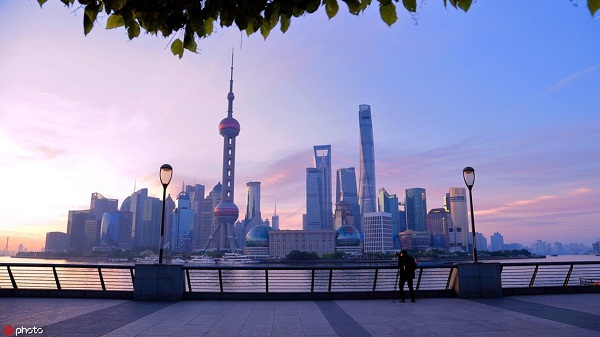Shanghai expects economic growth above 6 percent

Shanghai's city view. [Photo/IC]
Shanghai's economy grew last year despite the COVID-19 pandemic, the city's mayor said, adding that it plans to strengthen its role in global resource allocation and innovation in the next five years.
The city's GDP grew by 1.7 percent last year, Mayor Gong Zheng said in the municipal government work report at the annual session of the municipal people's congress, which opened on Sunday.
"Although hampered by COVID-19 and global economic recession, Shanghai overcame difficulties and took concrete measures to push the economy back on track from a 6.7 percent fall in the first quarter," Gong said.
Shanghai expects GDP growth of more than 6 percent this year and will keep the urban unemployment rate at no more than 5 percent, Gong said.
He added that the municipal government will ensure Shanghai is a safe city through strict inspections of people and goods and swift management of any public health emergencies.
In the past five years, the city's GDP has grown from 2.69 trillion yuan ($415 billion) to 3.87 trillion yuan, with per capita GDP exceeding $23,000 and residents' average disposable income reaching 72,000 yuan.
Shanghai has also greatly improved its business environment, with 236 multinational companies setting up regional headquarters in the city over the past five years, bringing the total to 771.
The amount of realized foreign investment in Shanghai last year was $20.2 billion.
This year marks the beginning of the country's 14th Five-Year Plan period, and Gong gave a briefing on the city's five-year plan.
Shanghai will further enhance the roles of the Lingang area of the China (Shanghai) Pilot Free Trade Zone, the demonstration zone for the integration of the Yangtze River Delta and the Hongqiao Business District as open hubs for the domestic and international markets.
It will build the city's Chongming district into a "world-class ecological island", and restructure industry in its Baoshan and Jinshan districts, which used to rely on the steelmaking and chemical industries.
The city will push three industries-integrated circuits, biomedicine and artificial intelligence-to grow rapidly and will list six sectors as key industries: electronics and information, automobiles, high-end equipment, advanced materials, healthcare, and fashion and consumer goods.
Shanghai will strive for big breakthroughs in fundamental research in science and key breakthroughs in core technologies. Last year, the city's expenditure on research and development reached 4.1 percent of its GDP.
"We shall put innovation at the core of overall development and fortify Shanghai as a source of innovation in science and technology," Gong said.
As China's financial center, Gong said Shanghai will continue to open its financial market to the world and push for the pilot project of renminbi digital currency. The city is the world's No 3 financial hub, following New York and London, according to last year's Global Financial Centers Index.
In terms of social welfare, Gong said the city will create more than 500,000 new jobs this year, establish 50 comprehensive elderly care centers and complete 10 million square meters of urban renewal targeting old houses in the city center.
 Contact Us
Contact Us

 Brilliant light show to illuminate Huangpu River
Brilliant light show to illuminate Huangpu River Maple leaves paint splendid scenery in Pudong
Maple leaves paint splendid scenery in Pudong Appreciate alluring lotus blossoms in Pudong's Century Park
Appreciate alluring lotus blossoms in Pudong's Century Park New pedestrian street boosts Pudong's night economy
New pedestrian street boosts Pudong's night economy 


